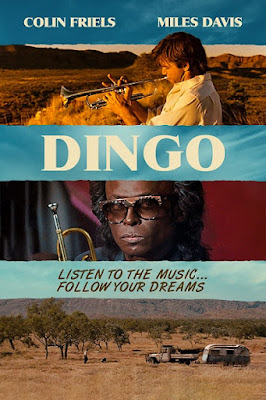There have been plenty of hard-swinging Australian jazz musicians, like Don Burrows, Bernie McGann, and James Morrison. Some of them even came from outback country, so the odyssey of John “Dingo” Anderson should not sound so outlandish. Regardless, it features Miles Davis on-screen and throughout the soundtrack. Frankly, it should have won best score at the Oscars, but someone messed up the paperwork. Some of us have been listening to the album for years, but now we can finally [re]-watch Rolf de Heer’s Dingo when it re-releases in select theaters today.
When he was a kid, Anderson happened to see American expat jazz musician Billy Cross perform an impromptu concert on the tarmac, while his plane was refueling on the remote Poola Flat airstrip. The sight was pretty surreal by any standard, but it was the music that really made an impression on Anderson. Cross could see it, so he told the young boy to look him up if he ever came to Paris.
Twentysome years later, Anderson is a knock-around handyman and dingo trapper with a wife and family, but he still idolizes Cross. Like Sonny Rollins woodshedding on the Williamsburg Bridge, Anderson has developed a healthy tone serenading the outback wilderness. However, everyone in his one-horse town thinks his jazz dreams are crazy, maybe even including his wife. Yet, it turns out Cross still remembers the boy from way back when.
Marc Rosenberg’s screenplay is nice enough but predictable. However, it really doesn’t matter, because the music is the thing here—and its incredible. The legendary Michel Legrand did most of the true composing, but Davis contributed some eloquent solos. Dingo Anderson’s playing was handled off-screen by Chuck Findlay, who also sounds great, while contrasting effectively with Davis’s patented muted style. Notable musicians also heard on the soundtrack include Alphonse Mouzon, Buddy Collette, Jimmy Cleveland, and Kenny Garrett, who was a regular sideman in Davis’s final bands.
Davis is also quite engaging portraying Cross, a character transparently based on himself. Like late-period Miles, Cross is reluctant to revisit his classic recordings and now primarily composes synthesizer music. Davis invests him with a sly off-kilter sense of humor, tempered by some hard-won (but never cynical) wisdom regarding the music business.
Honestly, the drama with Anderson’s family and a visit from his former romantic rival is pretty lame, but who cares. Tracks like “The Arrival,” “Concert on the Runway,” and “The Dream” are just arrestingly beautiful. This is probably the most unjustly overlooked soundtrack of the late 20th Century. Davis is magnetic on-screen, but Colin Friels is surprisingly earnest and engaging as Anderson, especially since he subsequently specialized in sleazy villains. As a bonus, vocalist Onzy Matthews makes an appearance playing another trumpeter at a Paris jam session.
Maybe Dingo waited so long for its digital release because of music clearance issues, but there would be no point in doing it without Legrand’s gorgeous themes and Davis’s tart, lyrical trumpet. It looks great too, capitalizing on its Outback and Paris locales. The Dutch-born de Heer would become a significant force in Australian indie cinema, helming films like Charlie’s Company. Here, he shows a real affinity for the jazz aesthetic. Very highly recommended, Dingo opens today (3/25) in select theaters and releases on DVD and digital VOD April 12.

